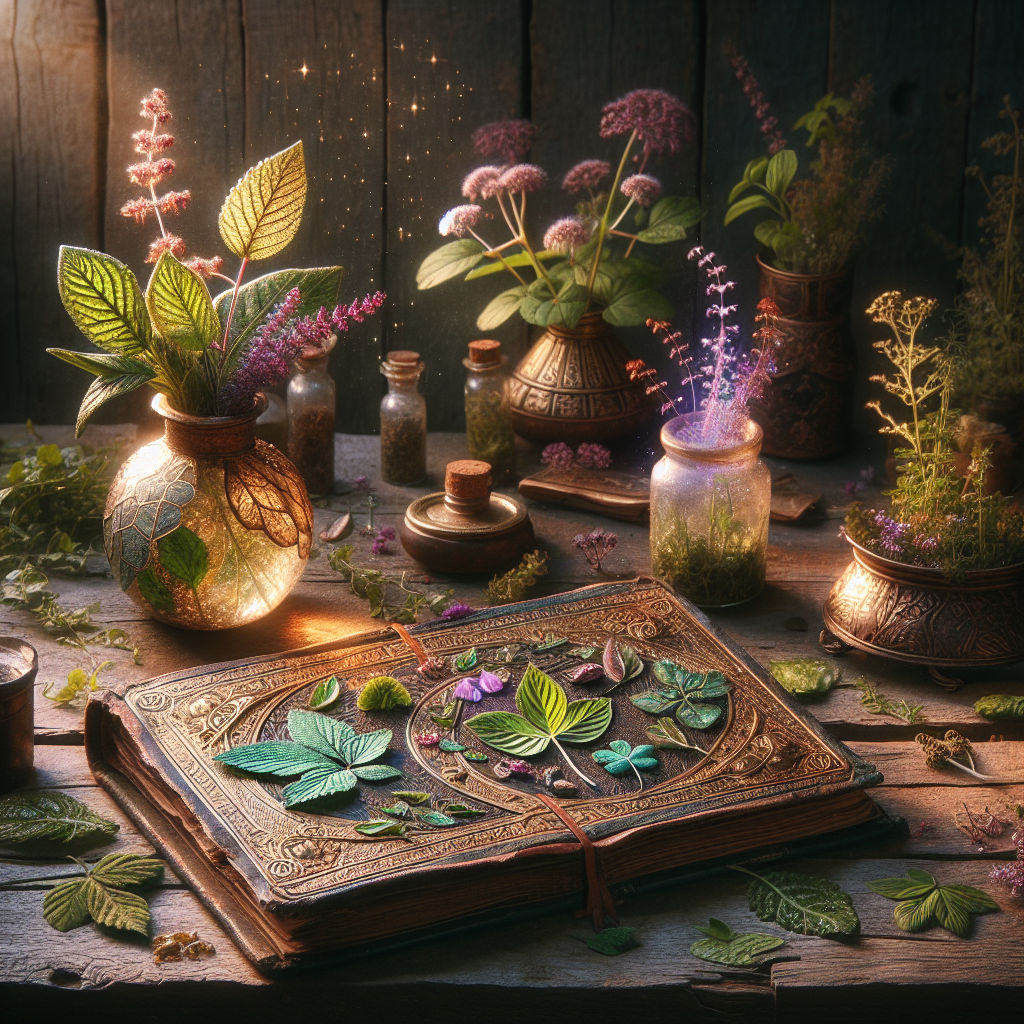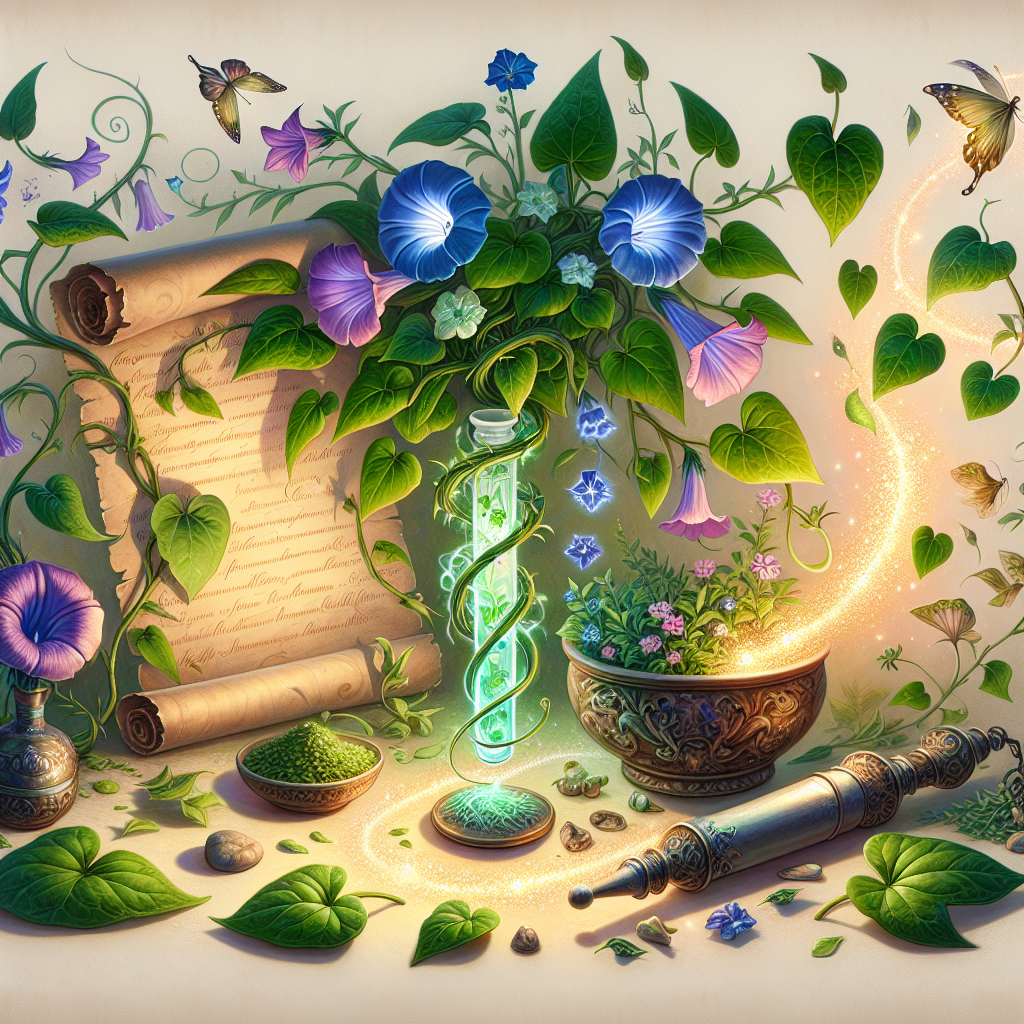As an Amazon Associate I earn from qualifying purchases.

Do you know that the intriguing world of magical herbs has bewitched humanity for centuries? From ancient charm spells to modern holistic healing, the use of these mystical botanicals offers a captivating blend of tradition, folklore, and modern usage. One of the definitive compendiums on this fascinating subject is ‘Magical Herbs: The Witch’s Guide to Botanical Power’, an engaging oeuvre that both illuminates and empowers its readers with an abundance of knowledge on herbal lore.
An enthralling journey through the annals of folk medicine and pagan spiritualism, this magnum opus has its roots deeply embedded in the wisdom of our predecessors. Edifying and informational, it serves as a bridge connecting the age-old practices of witchcraft with an increasing interest in natural healing remedies in today’s society. Traditionally, these witch’s herbs were used in incantations, rituals, and spells, whereas in the present context, their uses have expanded to treatment of physical ailments, cooking, and personal care products; underscoring the book’s relevance and interpretation to our modern era.
Magical Herbs: The Witch’s Guide to Botanical Power’ demystifies the metaphysical properties of these enchanting herbs, revealing the inherent power imbued in their leaves, stems, flowers, and roots. As surveys indicate, nearly 40% of Americans are incorporating herbal remedies into their healthcare regime, and books like this guide serve as a beacon guiding them safely through this botanical labyrinth. Where pharmaceutical medications often fail or bring unpleasant side-effects, the guide shows how these potent plants can offer efficacious, natural solutions.
This comprehensive guide elucidates over 200 mystical plants, from common household herbs like rosemary and thyme to plants shrouded in esoteric lore like belladonna and mugwort. It’s not merely a recital of properties; the book presents practical applications, magical correspondences, and recipes, ensuring readers not only learn about these herbs but also understand how to apply them in their personal practices, whether magical or medicinal. The astute combination of history, folklore, spiritualism, and practicality ensures its readers an enlightening and engaging experience.
Safety is another crucial component of ‘Magical Herbs: The Witch’s Guide to Botanical Power’. Maneuvering around the world of herbs can feel like navigating a minefield given that incorrect usage can lead to adverse effects. Realizing this, the guide balances its enthusiasm for plant power with an informative overview of safety measures in its usage, promoting both knowledge and responsible harnessing of the herbs’ potential.
Without confining its content solely to the realm of witchcraft, ‘Magical Herbs: The Witch’s Guide to Botanical Power’ provides a comprehensive overview that transcends its title. Its vast exploration of herbal potency, historical facts, and contemporary applications cements its importance as a resource for anyone interested in botanical power. It’s not only an essential companion for witches or practitioners of folk medicine but also a remarkable read for herbal enthusiasts or curious novices exploring the power of nature.
What are the Magical Herbs Used in Witchcraft and their Botanical Power?
At the core of witchcraft lies a deep respect and understanding for the natural world, where magical herbs play a crucial role. These herbs, each with their unique botanical power, are an integral part of rituals, spells, and natural healing processes conducted by witches. They offer a plethora of benefits – from invoking certain energies to creating protective barriers and promoting health and wellness. Each herb possesses distinct characteristics and applications in the realm of witchcraft, often personifying the connection between mankind and nature. In the following sections, we will delve further into these fascinating botanical wonders and explore their magical applications in witchcraft in greater detail. Join us as we journey into the enchanting world of magical herbs.
Magical herbs play a significant role in witchcraft and various other esoteric traditions. These plants, each with their unique magical properties, can be incorporated into spells, rituals, and potions to harness their energy. They have been used for centuries and continue to hold a fundamental place in the practice of modern-day witches.
Botanical Magic: Significance of Magical Herbs
In the world of witchcraft, magic is thought to flow through all living things – including plants. Many practitioners of the craft, also known as witches, use magical herbs as a way of interacting with this natural energy. These herbs are chosen based on their implied magical properties, defined by factors such as the plants’ appearance, scent, traditional uses, and often, correlations with various deities or planets.
Common Magical Herbs and their Uses
There’s a broad spectrum of magical herbs, each holding its unique essence and power. Here are some common examples:
1. Sage: Known for its purifying properties, Sage is often used in “smudging” rituals, where it’s burned to cleanse spaces and individuals of negative energy. It also enhances wisdom and mental clarity.
2. Lavender: Lavender is often associated with love, protection, and purification. It’s used in spells and potions intended to foster love, prevent nightmares, and even repel insects.
3. Chamomile: This herb is recognized for having powerful calming and healing properties. It’s employed in spells to attract abundance, purify spaces, and invoke tranquility.
4. Mint: Associated with abundance, mint brings prosperity and protection. When carried around, it can ward off illness and negativity.
5. Rosemary: An herb of remembrance, protection, and love. It’s frequently used in healing rituals, sachets, and amulets to shield against negative energies.
Practical Uses of Magical Herbs
Magical herbs can be used in various practical applications within witchcraft. They can be incorporated into spells, rituals, magical baths, and aromatherapy. They can also be fashioned into pouches and charms, infused into oils and tinctures, or burned as incense.
It’s crucial to remember that some herbs can be toxic if ingested, applied topically, or inhaled, so always do your research and handle them responsibly.
Growing Your Magical Herb Garden
Cultivating your magical herb garden allows you to develop a deeper connection with the plants. It involves imbuing the planting, nurturing, and harvesting processes with intention, transforming them into magical acts in their own right.
It’s important to consider planting and harvesting times, moon phases, and the associated magical properties when growing and using your herbs.
In the modern witch’s toolkit, magical herbs continue to hold immense power. According to the American Herbalist Guild, there has been a significant rise in the number of people across the United States embracing herbalism, with more than 15,000 professionally trained herbalists in 2017 – an increase of 70% from five years prior. This statistic underlines the growing interest in and appreciation for the ancient knowledge surrounding these potent plants.
1.
What are magical herbs?
Magical herbs are various types of plants that have been used for centuries in traditional and folk practices, such as witchcraft and magic, due to their unique spiritual and healing properties. These herbs are believed to help manifest intentions, provide protection, attract prosperity, and foster love or healing.
2.
How can I use magical herbs?
Magical herbs can be used in a variety of ways. Some common uses include spells and rituals, herbal teas, herbal baths, making sachets or charm bags, burning as incense, using in aromatherapy, or infusing in oils to make herbal remedies. You can also carry them with you, keep them in your living space, or use them in cooking.
3.
Are these herbs safe to use in magic?
Yes, generally, these herbs are safe for magic use. However, not all herbs are safe to ingest or touch, so it is essential to research each herb thoroughly before use. Always ensure that you have correctly identified each herb and understand its medicinal or toxic properties.
4.
Can anyone use magical herbs?
Yes, anyone interested in exploring the practice of herb magic can use magical herbs. However, beginners should be mindful of their intentions and respectful of the power these plants carry. It’s also crucial to learn about each herb before use to ensure safety.
5.
Where can I buy magical herbs?
Magical herbs can often be found in local health food stores, holistic healing centers, or specialized spiritual shops. Online, you can find many stores dedicated to selling ethically sourced and organically grown magical herbs. Some people prefer to grow their own herbs to form a more personal connection with them.
6.
How should I store my magical herbs?
Magical herbs should be stored in a cool, dark, and dry place to maintain their potency. Consider storing each herb in a separate glass jar with an airtight lid to keep them fresh. Label each jar with the herb’s name and the date of harvest or purchase for easy identification and tracking.
7.
Do magical herbs expire?
Yes, like any other botanical product, magical herbs will lose their potency over time and can spoil if not stored properly. How quickly they degrade depends on the herb itself and how it’s stored. Generally, dried herbs can last for up to a year, but it’s best to use them as fresh as possible.
8.
Can I substitute one magical herb for another?
Sometimes, it’s possible to substitute one herb for another based on their similar magical properties. However, if a specific herb is called for in a spell or ritual, it’s best to use the specified herb for optimal results. When in doubt, it’s best to do research or consult with more experienced practitioners.
9.
Do I have to use fresh herbs, or can I use dried ones?
Both fresh and dried herbs can be used in magical practices. Fresh herbs tend to carry more potency, but dried herbs offer the advantage of being available all year-round. Some spells and rituals may specify whether fresh or dried herbs should be used.
10.
Are there specific times to harvest or use magical herbs?
Many traditions believe in the concept of ‘magical timing.’ This suggests that certain phases of the moon, days of the week, or seasons can impact the effectiveness of the herbs’ magical properties. For instance, you may choose to harvest herbs during a full moon for maximum potency. However, this is not strictly necessary and ultimately depends on personal beliefs and practices.

Conclusion
Magical Herbs: The Witch’s Guide to Botanical Power truly emphasizes the importance and deeper understanding of the earth’s organic materials and their magical properties. The guide stresses the profound impact and influence different types of herbs can have in magical practices. From protection, love, prosperity, health to celestial connection, different species of herbs such as cinnamon, rosemary, witch hazel, lavender, and juniper, to name a few, have been traditionally utilized to manifest the desired intentions and consequences.
This guide also elucidates the correct methods of preparing and using these magical herbs. Whether it is creating spell jars, herbal incense, potpourri, or tinctures, every method has its unique power and function. It also emphasizes the ethical considerations of foraging and reminds readers always to take with respect and make use of every part so nothing is wasted. Above all, the understanding and respect for the natural rhythm of plants, seasons, and lunar phases were highlighted as an important aspect of successful magical workings. The power lies not just in the herbs themselves, but also in our connection and alignment with the natural world. This guide serves as a wonderful starter for those interested in learning about magical herbs, providing a rich blend of the historical, practical, and spiritual. Journeying into the world of magical herbs is, in essence, a journey of deepening our relationship with the very heart of nature itself.
Amazon and the Amazon logo are trademarks of Amazon.com, Inc, or its affiliates.
Continue Your Magical Journey
Free Witchcraft Starter Kit
Get 6 free printable PDFs: grimoire pages, moon calendar, spells, crystals, herbs, and tarot journal.
We respect your privacy. Unsubscribe anytime.
Enhance Your Practice
As an Amazon Associate, I earn from qualifying purchases.

